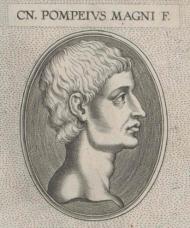Qui va sortir amb Cleòpatra VII?
Juli Cèsar data de Cleòpatra VII de ? fins a ?. La diferència d'edat era de 30 anys, 6 mesos i 10 dies.
Gnaeus Pompeius Magnus data de Cleòpatra VII de ? fins a ?.
Cleòpatra VII

Cleòpatra VII Filopàtor (grec antic: Κλεοπάτρα Φιλοπάτωρ) va ser la darrera reina d'Egipte, de la dinastia hel·lènica dels Ptolemeu, que va ser creada per Ptolemeu I Soter, general d'Alexandre el Gran. Va néixer cap a l'any 69 aC, i va morir l'any 30 aC. Era filla de Cleòpatra V Trifena i de Ptolemeu XII Auletes, de qui va heretar el tron l'any 51 aC a l'edat de 18 anys juntament amb el seu germà Ptolemeu XIII Filopàtor (que tenia tan sols 12 anys), que seria el seu home, segons el requeriment de les lleis de regnat i successió del moment.
llegir més...Juli Cèsar

Gai Juli Cèsar (llatí: Gaius Iulius Caesar), més conegut com a Juli Cèsar (Roma, d. 12 de juliol de 100 aC ↔ 13 de juliol de 100 aC - Teatre de Pompeu, 15 de març de 44 aC), va ser un líder polític i militar de l'era tardorepublicana. Nascut en el si de la gens Júlia, una família patrícia d'escassa fortuna, va estar emparentat amb alguns dels homes més influents de la seva època, com el seu oncle Màrius, qui influiria de manera determinant en la seva carrera política.
llegir més...Cleòpatra VII

Gnaeus Pompeius Magnus

Cneo Pompeyo el Joven (75 a. C. - 45 a. C.), político y general romano de finales de la etapa republicana (siglo I a. C.).
llegir més...